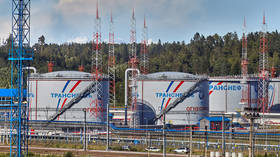
Belarus plans to raise the transit tariff by 10% next year

© Getty Images / Grigorev_Vladimir
Transit of Russian oil through Belarus will become more costly next year, the Kommersant business daily reported on Saturday, citing Russian energy export giant Transneft.
According to the report, the Belarusian operator of the Druzhba pipeline, Gomeltransneft Druzhba, has reached an agreement with Transneft to hike the transit tariff by 10.2% starting on February 1, 2024. A Transneft representative confirmed the information to Kommersant.
Russian oil is delivered to Hungary, Slovakia and the Czech Republic via Belarus through the southern branch of the Druzhba pipeline. The pipeline also carries Kazakh oil, which is delivered via its northern branch through both Russia and Belarus to Germany and Poland.
The tariff hike for Russian oil will be smaller than what Belarus previously intended. In mid-November, Gomeltransneft Druzhba proposed raising the tariff for the transit of oil through Belarus by 14.5% to 195.8 rubles ($2.1) per ton, but Transneft considered that hike too high. Minsk explained at the time that such a hike was necessary due to a sharp decrease in pumping after the EU placed sanctions on Russia in connection with the Ukraine conflict, which included a partial embargo on Russian oil imports. According to the operator, overall oil transit through the country fell nearly fivefold this year compared to 2022.
Meanwhile, Minsk also plans to raise the tariff for Kazakh oil, by 43% to 653.8 rubles per ton ($7.1), due to a 17-fold decrease in oil transit through the northern branch of the pipeline over the past year. Astana has been opposed to the hike, and reportedly plans to dispute the matter with Minsk.
READ MORE: EU countries get Russian oil exemption – Reuters
Transneft indicated that discussing tariffs on Druzhba’s northern branch is not within the company’s competence, because that part of the pipeline does not transport Russian oil. Russian Energy Minister Nikolai Shulginov earlier noted that Kazakhstan has not been involved in the tariff discussions because the pipeline does not belong to Kazakhstan. He indicated, however, that Astana and Moscow have already reached a consensus that Kazakhstan will supply 1.2 million tons (100,000 tons a month) of oil through Druzhba next year.
For more stories on economy & finance visit RT’s business section




